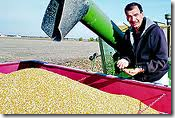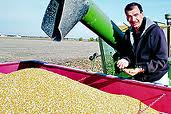 The declines in share markets keep on coming.
The declines in share markets keep on coming.
The turn of Asian shares to sit on investors’ weighing machine produced more of the declines which marred their Western peers on Thursday.
There was some sign of assets disappearing down the toilet less fast than in the last session, although it might not appear so from the 6.2% slump in South Korea’s Kospi index.
Tokyo stocks shed a more modest 2.5%, Shanghai stocks 1.1%, and the dollar added a less severe 0.2%. New York crude lost a less-panicky-looking 1.7% to $81.02 a barrel.
‘Caught in the storm’
That, of course, was hardly good news for food commodities, as Luke Mathews at Commonwealth Bank of Australia noted, saying that "the biggest skeleton in the grains’ closet is the influence of financial markets.
"The risk of a US and European recession has intensified. If global financial markets spiral out of control, agricultural commodities, no matter how tight their supplies are, will get caught in the storm," he said.
So, as might be expected, farm commodities headed downwards too although, mirroring broader markets, they were generally less enthusiastic in retreat this time – one notable exception beingsoybeans.
Chicago soybeans, which proved remarkably resilient in the last session, were additionally weakened by further news on selldowns by China, the top importer, of state reserves.
China plans to auction 4m tonnes of soybeans to edible oil groups such as Cofco and Wilmar’s Yihai Kerry Group, for a price of about 3,500 yuan, some $550, a tonne the 21st Century Business Herald said.
(Longer-term, the auction might provide market support, it that it will leave China with, reportedly, only 1.4m tonnes of state reserves left.)
IL and IA
Even so, the oilseed’s decline was hardly catastrophic for bulls, at 0.6%, leaving the November lot at $13.52 ¾ a bushel as of 07:00 GMT (08:0 UK time).
Weather in the US remains reasonably supportive.
"Soybean crop conditions and production are of concern, with key states of Illinois and Iowa unusually dry, with weekly US drought monitor expanding dry areas to cover all but the northern quarter of Illinois and northern half of Iowa," Kim Rugel at Benson Quinn Commodities said.
"Recent rains have not been able to make the leap over the river into Illinois," he said, while adding that forecasts for the weekend and next week predicted moisture, "which if realised should reduce stress of pod-filling soybeans".
And, bottom line, "grains still have good fundamentals", Mike Mawdsley at Market 1 said.
‘Big unknown’
There is of course, "a big unknown as to just what do we have for a crop out there for corn and soybeans", which may gain some answers in next week’s ProFarmer crop tour.
"All eyes and ears will be waiting to see and hear what they are finding," Mr Mawdsley said.
And, for corn, there is particular interest in Illinois and Iowa too, with Benson Quinn noting that "various trade houses have been questioning as to whether the US Department of Agriculture August projected yields for Illinois and Iowa will hold up of 170 and 177 bushels per acre respectively".
"They are both well above last year’s levels of 157 and 165 bushels per acre."
Chicago corn limited its losses to 0.4% for December delivery, taking the lot to $7.10 ¼ a bushel.
More rain in Aus
And that helped wheat, a relatively poor performer last time, limit its decline to 0.6%, to $7.03 ¼ a bushel, for Chicago’s September contract.
Minneapolis wheat eased 0.3% to 9.08 ½ a bushel for September, again gaining succour from a delayed US spring wheat harvest.
As an extra downer to wheat, reports continue to come of healthy rains in Australia, where eastern dryness had begun to raise eyebrows.
Both Luke Mathews at CBA and Australia & New Zealand Bank’s Paul Deane said the rain had improved crop prospects.
"The east coast and South Australian wheat belt has now received August average rainfall with still 11 days to go," Mr Deane said.
He added: "The short-term rainfall outlook is predominantly dry for the east and west coast wheat belts over the weekend, but potential good rainfall in Western Australia on Monday."
‘Fundamentals remain bullish’
In Asia, palm oil for November fell, but not too heavily, down 0.5% at 3,011 ringgit a tonne in Kuala Lumpur.
"Palm oil’s fundamentals remain bullish, despite the uncertain economic outlook," Ker Chung Yang at Phillip Futures said.
Confidence in the uptick in Malaysia’s production has waned, at a time of growing optimism for Chinese imports.
But rubber, lost a halo provided in the last session by data showing Japanese carmakers will build nearly 23m vehicles (worldwide) in the year to next March, close to the 2006-07 record.
Tokyo’s January lot tumbled 2.7% to 352.40 yen a kilogramme.

Deprecated: strpos(): Passing null to parameter #1 ($haystack) of type string is deprecated in /home/agriviek8Qv/agriviet.net/public_html/wp-includes/comment-template.php on line 2522